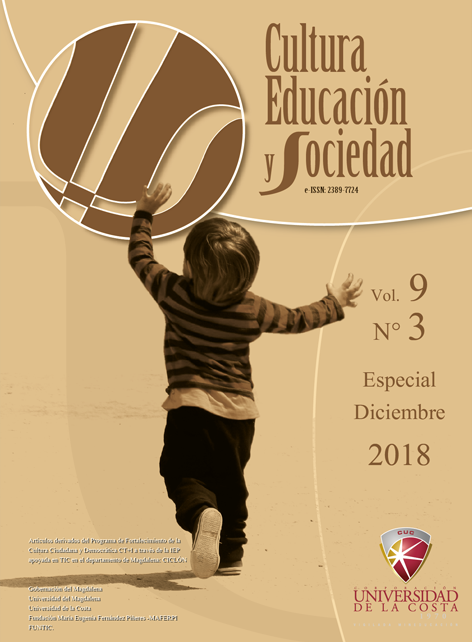Training in values through Research as a Pedagogical Strategy in school
DOI:
https://doi.org/10.17981/cultedusoc.9.3.2018.97Keywords:
Training in values, play, research, basic education.Abstract
Education has presented significant changes throughout the 21st century, where the role of the teacher and the pedagogical strategies used in the classroom are fundamental elements that favor the teaching - learning process. In this article we sought to promote the formation of values through Research as a Pedagogical Strategy in basic education. A descriptive, field and transactional study was carried out, to select the sample, a convenience sampling was carried out where one hundred and eighty (180) students from the IED Buenos Aires, San Martin campus were selected in courses comprised between the first and fifth years of primary school. , where activities were proposed according to the level of schooling and age. At present, there are difficulties at the level of school coexistence in their students, conflicts in the classroom, which impede the timely development of classes, are observed more frequently in the educational institution of Buenos Aires, for this reason, it is imperative to design a educational project aimed at promoting the formation of values through research as an IEP pedagogical strategy, to encourage students to have effective relationships that contribute to the improvement of interpersonal relationships
Downloads
References
Arufe, V. (2011). La educación en valores en el aula de educación física. ¿mito o realidad? Revista Digital de Educación Física. Vol. 2, Núm. 9.
Botero, C. (2006). Los ejes transversales como instrumento pedagógico para la formación en valores. Revista Politécnica. Vol. 2, Núm. 3.
Conejo, P. (2012). El valor formativo de la música para la educación en valores. Revista de Educação e Humanidades, Vol. 2, pág. 263-278.
Díaz, A. (2006). La educación en valores: Avatares del currículum formal, oculto y los temas transversales. Revista electrónica de investigación educativa. vol. 8 no. 1.
Galrin, J., & Fernández, J. (2010). Enseñar matemáticas con recursos de ajedrez. Revista. Tendencias Pedagógicas. vol. 1. nº 15.
Gómez, M. (2006). Introducción a la metodología de la investigación científica. Editorial brujas. España.
Hernández, R., Fernández, C., Baptista, M. (2010). Metodología de la Investigación (5ta ed.). The MacGraw-Hill. México.
Landinez-Lamadrid, D. C., Ramirez-Ríos, D. G., Neira Rodado, D., Parra Negrete, K., & Combita Niño, J. P. (2017). Shapley Value: its algorithms and application to supply chains. INGE CUC, 13(1), 61-69. https://doi.org/10.17981/ingecuc.13.1.2017.06
Mariño, G. (2010). “El diálogo en la educación de jóvenes y adultos. Dos propuestas pedagógicas para implementarlo”. En: El taller dialógico / la recuperación de experiencias laborales. Bogotá. OEI. 2010.
Mejía, M & Manjarrés, M. (2010) La Investigación como Estrategia Pedagógica. Programa Ondas – Colciencias.
Núñez, E., & Ravina , R. (2017). Análisis del nivel de competitividad empresarial en el panorama publicitario colombiano fundamentada en el éxito creativo y la responsabilidad ética y jurídica. Juridicas CUC, 13(1), 9-28.
Ortega, P., Peñuela, D & López, D. (2009). Sujetos y prácticas de la pedagogía crítica. Ediciones El Búho. Bogotá.
Parra, J. (2003). La Educación en valores y su práctica en el aula. Revista Tendencias Pedagógicas Vol. 8. Pág. 69.
Pino, M., & Urrego, Y. (2013). La importancia de las funciones ejecutivas para el desarrollo de las competencias ciudadanas en el contexto educativo. Cultura Educación y Sociedad, 4(1).
Pozo, J. & Gómez, M. (2006) Aprender y enseñar ciencia. Ediciones Morata. 5ta. Edición. Madrid.
Sabino, C. (2006). Como hacer una tesis y elaborar todo tipo de escritos. Editorial Panapo. Venezuela.
Sisiruca , M., & Salazar, C. (2014). Valores éticos de la responsabilidad social interna en centros de producción audiovisual. Económicas CUC, 35(1), 79-90.
Vital, M. (2009). La investigación en los procesos de enseñanza aprendizaje. Rev. Vida Científica No. 6.
Downloads
Published
How to Cite
Issue
Section
License
Copyright (c) 2018 CULTURA EDUCACIÓN Y SOCIEDAD

This work is licensed under a Creative Commons Attribution-NonCommercial-NoDerivatives 4.0 International License.
![]()
Creative Commons 2020 CULTURA EDUCACIÓN Y SOCIEDAD
This article is under international license Creative Commons Reconocimiento-NoComercial-SinObrasDerivadas 4.0.
The published articles are the sole responsibility of their authors and do not necessarily reflect the opinions of the editorial committee.
CULTURA EDUCACIÓN Y SOCIEDAD respects the moral rights of its authors, who assign to the editorial committee the patrimonial rights of the published material. In turn, the authors inform that this work is unpublished and has not been previously published.
All articles are under a:
Licencia Creative Commons Atribución-NoComercial-SinDerivadas 4.0 Internacional.
![]()


 English
English
 Español (España)
Español (España)




_12.53_.27_p_. m_._3.png)





_12.57_.35_p_. m_._3.png)
_12.50_.37_p_. m_._3.png)



